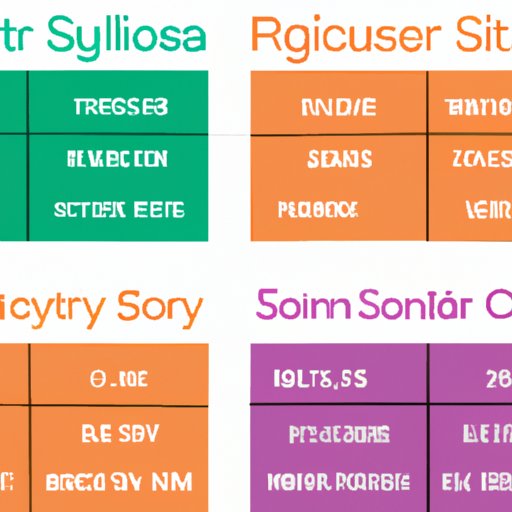Introduction
Cyber security is a growing field that is essential in protecting businesses and organizations from malicious attacks and data breaches. As cyber threats become more sophisticated, the need for highly skilled cyber security professionals increases. With this comes the question: How much does a cyber security make?
The answer to this question depends on a variety of factors, such as the level of experience, education, and the industry in which one works. In this article, we will explore the average salary for cyber security professionals, as well as how education and experience can impact pay. We will also examine the differences between public and private sector salaries, and look at what benefits come with a cyber security position.

Exploring the Salaries of Different Levels of Cyber Security Specialists
According to the Bureau of Labor Statistics (BLS), the median annual wage for information security analysts was $99,730 in May 2019. However, the salary for cyber security professionals can vary greatly depending on the level of experience.
Entry Level Positions
Entry-level cyber security positions typically include roles such as security analysts and system administrators. According to PayScale, the average salary for entry-level security analysts is $63,898 per year, while the average salary for entry-level system administrators is $57,764 per year.
Mid-Level Positions
Mid-level cyber security positions typically include roles such as security engineers and security architects. According to PayScale, the average salary for mid-level security engineers is $92,944 per year, while the average salary for mid-level security architects is $107,060 per year.
Senior Level Positions
Senior-level cyber security positions typically include roles such as chief information security officers (CISOs) and security directors. According to PayScale, the average salary for senior-level CISOs is $171,945 per year, while the average salary for senior-level security directors is $146,373 per year.
Examining the Impact of Education and Experience on a Cyber Security Salary
The Role of Education
Education is an important factor when it comes to determining the salary of a cyber security professional. A bachelor’s degree in computer science or a related field is typically required for entry-level positions, while a master’s degree may be preferred for higher-level positions. According to a survey conducted by ISACA, those with a master’s degree earned an average of $118,042, while those with a bachelor’s degree earned an average of $100,120.
The Role of Experience
Experience is also a major factor when it comes to determining the salary of a cyber security professional. Those with more experience tend to earn higher salaries, as they have the necessary skills and expertise to handle more complex tasks. According to the same survey conducted by ISACA, those with 11 to 20 years of experience earned an average of $132,831, while those with 21 or more years of experience earned an average of $151,145.

Investigating the Pay Differential Between Public and Private Sector Cyber Security Jobs
Public Sector Salaries
Cyber security professionals in the public sector often earn lower salaries than their counterparts in the private sector. According to the BLS, the median annual wage for information security analysts in the federal government was $97,978 in May 2019. This is slightly lower than the median annual wage for information security analysts in the private sector, which was $99,730.
Private Sector Salaries
Cyber security professionals in the private sector tend to earn higher salaries than their counterparts in the public sector. According to Glassdoor, the average salary for a cyber security engineer in the private sector is $129,907 per year, while the average salary for a cyber security analyst is $90,067 per year.
How to Maximize Your Earning Potential in Cyber Security
There are several ways to maximize your earning potential in the cyber security field. Networking opportunities, professional certifications, and keeping up with industry trends can all help you stay ahead of the competition and command a higher salary.
Networking Opportunities
Networking is an important part of finding new job opportunities and advancing your career. Attending conferences, joining professional organizations, and connecting with other cyber security professionals can help you gain valuable insights into the industry and put you in contact with potential employers.
Professional Certifications
Professional certifications can demonstrate your knowledge of the latest cyber security technologies and best practices. Popular certifications include Certified Information Systems Security Professional (CISSP), Certified Ethical Hacker (CEH), and CompTIA Security+. According to PayScale, the average salary for workers with a CISSP certification is $117,162 per year, while those with a CEH certification earn an average of $106,633 per year.
Keeping Up with Industry Trends
Staying up to date with the latest trends in cyber security is essential to staying competitive in the field. Reading industry publications, attending webinars, and taking online courses can help you stay informed about the latest developments and give you an edge when competing for jobs.
What Benefits Come with a Cyber Security Position?
In addition to a competitive salary, many cyber security positions come with a range of benefits, including health insurance, retirement accounts, and vacation time. According to a survey conducted by ISACA, the most common benefits offered to cyber security professionals are health insurance (81%), paid holidays and vacation time (77%), and 401k/403b retirement plans (73%).

A Comparison of Cyber Security Salaries Across Different Industries
The average salary for cyber security professionals varies across different industries. According to PayScale, the average salary for a cyber security professional in the technology sector is $105,841 per year, while the average salary for a cyber security professional in the financial services sector is $111,735 per year. The average salary for a cyber security professional in the healthcare sector is $105,238 per year.
Conclusion
Cyber security is an increasingly important field of work across many industries, and the salaries for cyber security professionals can vary significantly depending on the level of experience, education, and the industry in which one works. Those who want to maximize their earning potential should consider networking opportunities, professional certifications, and keeping up with industry trends. Additionally, many cyber security positions come with a range of benefits, including health insurance, retirement accounts, and vacation time.
(Note: Is this article not meeting your expectations? Do you have knowledge or insights to share? Unlock new opportunities and expand your reach by joining our authors team. Click Registration to join us and share your expertise with our readers.)
